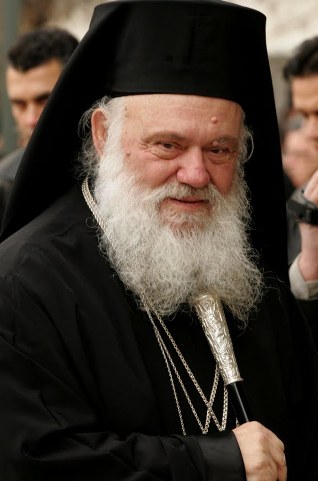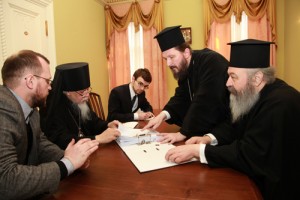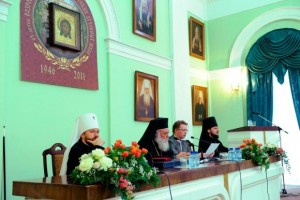On May 29, 2012, a delegation from the Orthodox Church of Greece visited the Moscow Theological Academy and Seminary. Archbishop Ieronymos of Athens and All Greece addressed the teachers and students. His Beatitude then responded to questions from those present.
 Your Beatitude, what is the situation in Greece with electronic passports? What is the position of the Orthodox Church of Greece with regard to this question?
Your Beatitude, what is the situation in Greece with electronic passports? What is the position of the Orthodox Church of Greece with regard to this question?
In order to shed light on this issue, I remind you of another question that provoked a lively discussion: opposition to the number 666. This number, as the seal of the antichrist, caused an enormous protest movement within Greek society. When I was asked about my attitude to such a combination of numbers, I replied: if you had a phone number that contained three sixes, would you use it? If you were sent as a present a check for 666,000 dollars, Euros, or rubles, would you accept or refuse it? Having received the great gift of the grace of the Holy Spirit at Baptism and in the Mysteries, are we really frightened of an insignificant electronic identification? I said this to those studying in the theological schools in Greece, and I will now say this to you now: we should guard Tradition, but not be the sorts who battle against advanced technology.
Wherever the Church sends you to serve as priests, whether in a city or a village, you will need to make use of the Internet and everything that science has to offer. And you should remind the people around you that these devices can be used for the service of the Church, that they can contribute to our daily labors in fulfilling the commandments of our Lord Jesus Christ.
If Christ will be within us, in our hearts and minds, then we need not fear anyone whomsoever, for no one can cast Christ from us.
Your Beatitude, does the phenomenon of Greek nationalism exist within the Greek Church? If so, is it an obstacle to Christian witness in the world?
In Greece there is a widespread concept of “patriotism,” which means love and reverence for one’s homeland, one’s parents, and the place where you were born. The word “nationalism” also exists in our language. This term appeared among us during the Renaissance, when particular attention was paid to the nation and to ethnicity. Our faith teaches us that we should love our fatherland and fight for it. Unlike patriotism, nationalism is not at all akin in spirit to Orthodoxy, because our faith is above nations; those who attempt to use the Orthodox faith for nationalistic ends are outside the truth. Patriotism and nationalism are different concepts. One we praise and the other we condemn.
In contemporary Russia one can observe from time to time such a thing as “Orthodox paganism,” when people who are Baptized go to church and light candles, but all the while do not participate in the Mysteries and do not know God’s commandments. Does this phenomenon exist in the Greek Church?
This phenomenon is not only connected with difficult times in history, when people were cut off from the Church. Such a phenomenon can be found throughout the entire world.
At the same time, we need to remember that we cannot examine and check the depth of every heart. Only God knows the depths of the human heart. Do not think that if one of us is a great preacher, someone who is skilled in speaking and serves every day, that he will necessarily attain holiness and be close to Christ. You are now young; enthusiasm can be seen in all of you. I pray that when you become priests you will not be defeated by the daily routine, that your faith not turn into a habit. We have read about the history of the Russian nation and the Russian Church during times of persecution. We know that grandmothers took their grandchildren and secretly performed the Mystery of Baptism over them. Despite the danger to themselves and to their work, they tried in one way or another to teach the faith to children. These were the greatest preachers in Russia.
Translated from the Russian


















